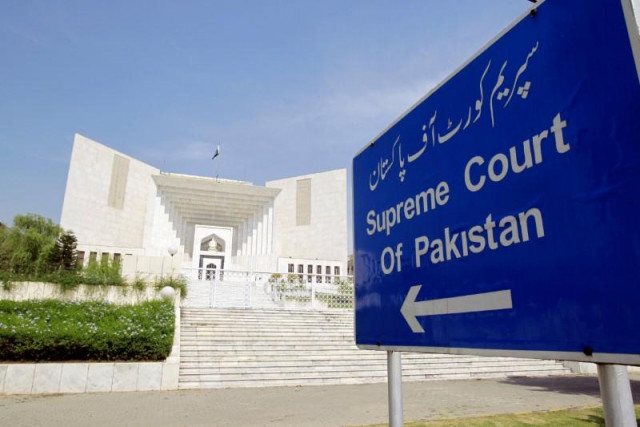No relief for Nawaz unless IHC rules in his favour: CJP
Khosa acts on AGP's advice not to decide on the matter or 'it may affect Nawaz's appeal in high court'

A view of the Supreme Court of Pakistan in Islamabad. PHOTO: REUTERS
The court made it clear that no relief could be given to Nawaz unless the Islamabad High Court (IHC) ruled in his favour.
A three-judge Supreme Court bench, headed by Chief Justice of Pakistan Asif Saeed Khosa and comprising Justice Sheikh Azmat Saeed and Justice Umar Ata Bandial, on Tuesday resumed hearing of constitution petitions filed by three local lawyers seeking probe into the video controversy.
On the last date of hearing, the bench summoned Attorney General for Pakistan (AGP) Anwar Mansoor Khan to assist the court in finding a possible option to further the proceedings in this matter.
During the hearing on Tuesday, the AGP proposed the bench not to decide on the matter otherwise it might affect Nawaz's appeal pending in the IHC. "Let the aggrieved person approach the high court," he added.
The chief justice while agreeing with the AGP's suggestion wondered that despite levelling serious allegations, no one approached the IHC to seek relief in this matter after the release of the judge's video.
He remarked that no relief could come out unless the high court gave its ruling.
"It's very strange that allegations have been levelled, but no one moved the high court, which is the real forum for seeking relief for a convict who is in jail," said the CJP.
He said those who were interested in the release of Nawaz should approach the IHC for relief.
The CJP observed that they (SC) were not in a hurry as acting in such a manner would mean jumping into a nightmare, adding that they would intervene in the matter with "care and wisdom".
"Should we interfere in the matter for just headlines in the media? Will our interference prejudice anyone's case?" he questioned.
The chief justice also believed that the high court had two capacities in which it could look into the matter. Firstly, as appellant court, wherein appeal of a convict could be decided. Secondly, the high court had constitutional authority under Article 203 of the Constitution to investigate the matter related to affairs of the subordinate court.
The CJP said that the high court had all options to adjudicate the matter. "Either it may decide the case by itself on the basis of fresh evidences or it may refer it to trial court for recording new evidences," said CJP Khosa. "There is a need for admissible evidences in criminal proceedings."
The CJP also noted that the Federal Investigation Agency's (FIA) finding in this matter would be an opinion unless it was brought before the high court as admissible evidence.
Regarding the alleged misconduct of the judge, the CJP said that matter would not be unattended as he met the people who had been convicted by him. "This is a serious matter which will not be left unattended," he adds.
However, another member of the bench, Justice Umar Ata Bandial, said that he was talking on his own behalf that they had to establish the truth of allegations of either party.
"We are looking for a remedy for those who are aggrieved. We want to protect the integrity of the institution. We are not just examining the allegations of the complainant," he added.
The judge said that one member of this institution had been maligned, adding that investigation should be conducted "fairly".
However, the third member of the bench, Justice Sheikh Azamt Saeed, agreed with the AGP's suggestion that the matter be referred to the high court for decision.
However, despite giving these observations, the bench did not dispose of the matter and decided to wait for the FIA inquiry report on the complaint of Accountability Court Judge Arshad Malik against the alleged blackmailing by some individuals through recording a video in favour of Nawaz.
The FIR has been registered under sections 13, 20, 21 and 24 of Prevention of Electronic Crimes Act 2016.
One accused person Mian Tariq Mahmood, who had sold the video of the judge to another person Saleem Raza, was in judicial remand but he (Mahmood) claimed that the cheque he received in exchange for the video could not be cashed.
Two accused Saleem Raza and Nasir Butt had already left the country.
On the query of the bench, the AGP told that efforts were being made to ascertain the originality of the video used in the press conference held by PML-N leaders on July 6.
The AGP also stated that the judge had claimed that that video was manipulated through audio recording.
Earlier, the AGP while suggesting several options to proceed in this matter informed that the FIA had already initiated an inquiry into the matter. However, contempt of court proceedings might also be initiated under the National Accountability Bureau law while action could be taken under the PPC law.
The AGP stated that the PEMRA could initiate action over violating the code of conduct. "The SC may itself form a commission under the Supreme Court Rules 1980 to probe into the matter," he added.
The CJP; however, said that the government might itself form a commission to look into the matter under the law.
In the meanwhile, the bench gave three weeks to the FIA to complete the inquiry.
Sources in the PML-N said that the party's legal team did not want to pursue the matter in near future as it had no trust in the superior judiciary for getting any relief.



















COMMENTS
Comments are moderated and generally will be posted if they are on-topic and not abusive.
For more information, please see our Comments FAQ